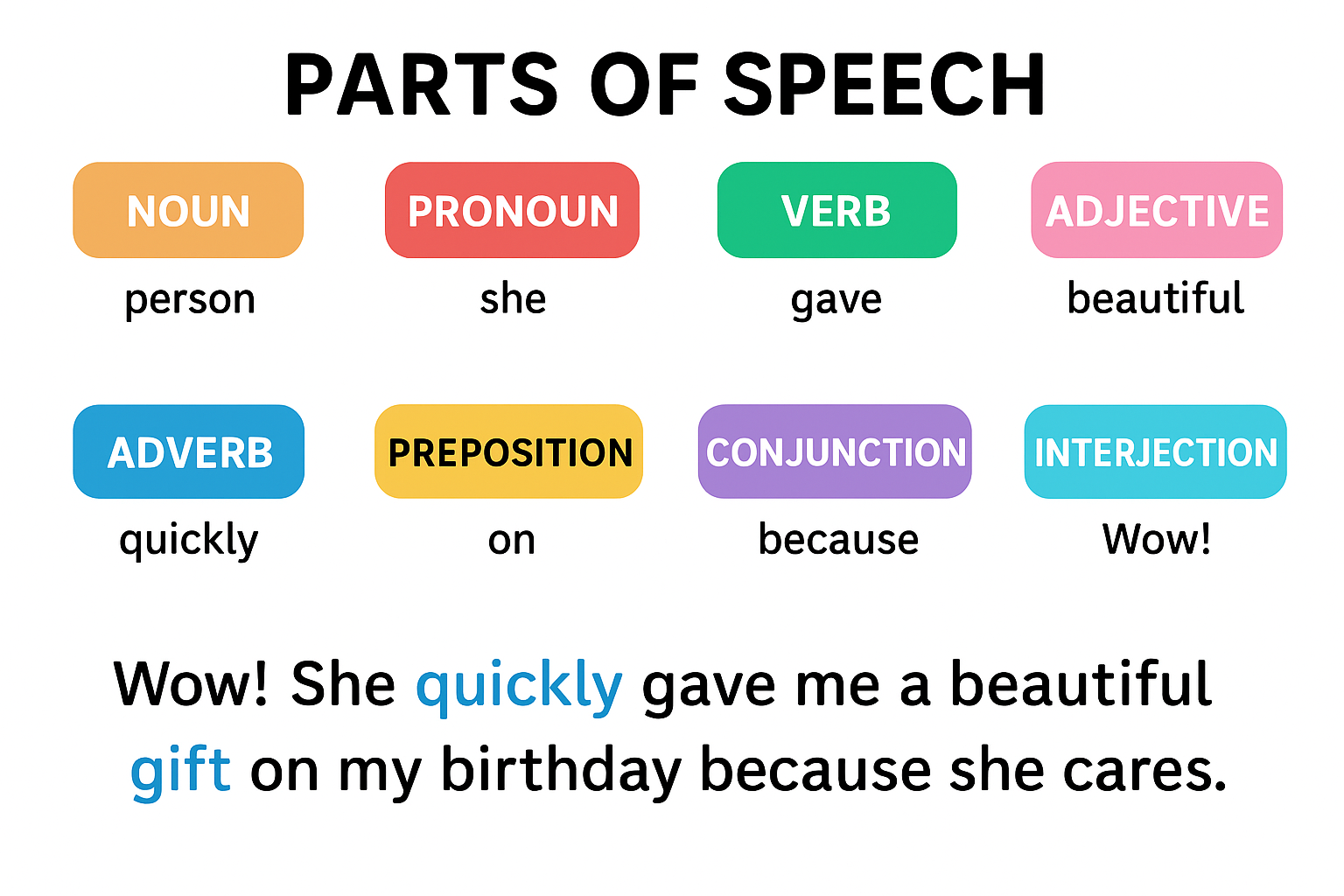Parts of Speech in English
Categories: Basic English Grammar Accuracy

Parts of Speech in English
In English grammar, parts of speech are the basic building blocks of sentences.
There are 8 traditional parts of speech (sometimes extended to 9 or 10 in modern grammar).
1. Noun
A noun is a word that names a person, place, thing, or idea.
Types of Nouns:
Proper noun: specific name → John, London, Coca-Cola
Common noun: general name → boy, city, drink
Concrete noun: physical → table, dog, apple
Abstract noun: idea/feeling → happiness, freedom, love
Countable noun: can be counted → book, car
Uncountable noun: cannot be counted → milk, money
Examples:
The dog barked.
She lives in Paris.
Happiness is important.
2. Pronoun
A pronoun is a word that replaces a noun to avoid repetition.
Types of Pronouns:
Personal pronouns: I, you, he, she, it, we, they
Possessive pronouns: mine, yours, his, hers, ours, theirs
Reflexive pronouns: myself, yourself, themselves
Relative pronouns: who, which, that
Demonstrative pronouns: this, that, these, those
Interrogative pronouns: who, what, which
Indefinite pronouns: someone, anyone, everybody, nothing
Examples:
She is my friend.
This is mine.
The man who called you is here.
3. Verb
A verb shows action, state, or occurrence.
Types of Verbs:
Action verbs: run, eat, write
Linking verbs: is, am, are, was, become, seem
Auxiliary (helping) verbs: do, does, did, will, have, be
Modal verbs: can, may, must, should, could
Examples:
She runs every morning.
He is a doctor.
They have finished their work.
4. Adjective
An adjective describes or modifies a noun or pronoun.
Types of Adjectives:
Descriptive: big, small, beautiful
Quantitative: some, many, few, several
Demonstrative: this, that, these, those
Possessive: my, your, their
Interrogative: which, what, whose
Examples:
She has a red dress.
There are many books.
This car is mine.
5. Adverb
An adverb modifies a verb, adjective, or another adverb.
What adverbs tell us:
How? → quickly, slowly
When? → yesterday, now
Where? → here, there
How often? → always, never, often
To what degree? → very, too, quite
Examples:
She sings beautifully. (modifies verb)
He is very smart. (modifies adjective)
She speaks too slowly. (modifies adverb)
6. Preposition
A preposition shows the relationship between a noun/pronoun and another word in the sentence.
Common Prepositions: in, on, at, by, with, under, over, between, into, during, about
Examples:
The book is on the table.
He went to school.
She lives in London.
7. Conjunction
A conjunction joins words, phrases, or clauses.
Types of Conjunctions:
Coordinating: and, but, or, so, yet, for, nor
Subordinating: because, although, if, when, since, while
Correlative: either...or, neither...nor, not only...but also
Examples:
I like tea and coffee.
She is tired but happy.
Although it rained, we played football.
8. Interjection
An interjection expresses strong emotion or sudden feeling.
Examples:
Wow! That’s amazing.
Oh! I forgot my keys.
Hey! Stop there.
✅ Extra (sometimes included)
9. Articles/Determiners
Words that introduce nouns.
Definite article: the
Indefinite articles: a, an
Determiners: this, that, some, any, my, his, few, many
Examples:
The sun rises in the east.
I saw a dog.
My brother is a teacher.
Example Sentence with All Parts of Speech
Wow! She quickly gave me a beautiful gift on my birthday because she cares.
Wow! → Interjection
She → Pronoun (Subject)
quickly → Adverb (How?)
gave → Verb (action)
me → Pronoun (Object – Indirect)
a → Article
beautiful → Adjective
gift → Noun (Object – Direct)
on → Preposition
my → Determiner/Possessive Adjective
birthday → Noun
because → Conjunction
she → Pronoun
cares → Verb
✅ Summary:
8 Parts of Speech: Noun, Pronoun, Verb, Adjective, Adverb, Preposition, Conjunction, Interjection (+ Articles/Determiners).
Every sentence is built from these categories.
Mastering them is the foundation of English grammar.